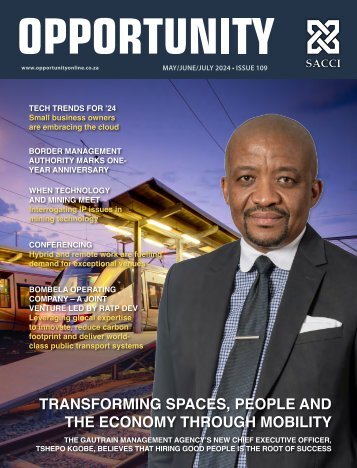South African Business 2016 edition
- Text
- Investment
- Government
- Business
- Development
- Network
- Sectors
- Investing
- Business
- Africa
- African
- Economic
- Manufacturing
- Mining
- Opportunities
- Economy
- Overview
OVERVIEW (Continued from
OVERVIEW (Continued from page 118) International giants like Microsoft, Hewlett-Packard, IBM, ICL, Cisco and Unisys have a strong presence in South Africa. International companies sometimes partner with local concerns, as in the case of Bharat Sync Technologies of India, who are rolling out mobile email push and calendar services with South Africa’s Milestone Connexions. Local manufacturing and assembly is increasing with companies such as Sahara Computers and Mecer. Since 2009, a number of new undersea cables have landed in South Africa, significantly boosting competition and making ADSL possible. Traditional technologies for broadband connection (dial-up and VSAT) are declining in popularity in South Africa as more sophisticated mobile technology becomes available. This includes WiMax, HSDPA and HSPA+. Growth in the sector is expected to be driven by mobile broadband and services that add value in the data field. Dube TradePort (DTP) has spent more than R100-million on ICT infrastructure that includes two data centres. Working with Dimension Data and Business Connexion, DTP sells voice and data services at a cheaper rate to its tenants. World Wide Worx reports that 46% of large South African firms are using cloud computing in one form or another. The Gauteng Provincial Government is developing a Smart City at Nasrec south of Johannesburg, which will comprise: • Electronics assembly and manufacturing • ICT research and development centre • ICT connectivity and transaction switching centre • Call-centre facility with 5 000-seat capacity • ICT knowledge centre in partnership with international companies such as ITE Education Services (Singapore) and MIT (US) Innovation in the sector will be encouraged by the mLab, a centre designed to support entrepreneurs in the mobile technology field. The CSIR in Pretoria hosts the facility together with The Innovation Hub. Public transport systems are moving to cashless ticketing supported by ICT. Digicore and Absa Bank have combined in Cape Town to roll out the system for minibus users driving between the city and the V&A Waterfront. With Vodacom spending in the region of R6-billion per year on its 3G and 4G long-term evolution network (LTE), the capacity of South Africa’s telecommunications network is growing fast. MTN and 8ta are also investing in LTE. MTN Business has given further weight to its intentions of supporting open access fibre networks by announcing a multi-tier model that leverages off MTN’s fibre infrastructure and applies equally to enterprise end-users, households, and SME users. Alpheus Mangale, Chief Enterprise Business Officer at MTN Business, says this solution is informed by the strategic decision the business has taken to give impetus to open access networks. “While MTN will continue to provide the high end, dedicated fibre network services complete with enterprise-grade service level agreements, smaller businesses will also benefit from MTN’s investment in its fibre infrastructure,” says Mangale. Hatfield says the market and timing is ripe for South Africa’s fibre infrastructure to graduate to the next phase that will be underpinned by shared services and infrastructure that will support greater affordability and choice. Mobile technology is being used in innovative ways by South Africa’s banking sector to gain new customers. Products include Absa’s PayPebble, Nedbank’s Approve-it, Standard Bank’s community banking and FNB’s eWallet application. Mobile phone penetration in South Africa currently stands at 138% (total connections) and 66% (individual subscribers) (Businesstech). These figures are expected to reach 171% and 79% by 2017. SECTOR INSIGHT • ICT spending is outpacing real GDP growth. • Government ICT spend is set to reach 7.6m in 2019. • Two-thirds of SA’s ICT companies are located in Gauteng. SOUTH AFRICAN BUSINESS 2016 120
MTN rolls out fibre infrastructure PROFILE FOCUS MTN Business now offers wholesale multi-tiered service offering to all. MTN Business has given further weight to its intentions of supporting open access fi bre networks by announcing a multi-tier model that leverages off MTN’s fi bre infrastructure and applies equally to enterprise end-users, households, and SME users. MTN’s multi-tier model gives MTN the ability to cater to the individual needs of each customer segment. This service is a step up from traditional offering where other service providers are able to piggy-back off MTN’s fi bre infrastructure. The next level up from this is the reseller service that smaller IT service providers or residential property managers can offer as a value-added service. Alpheus Mangale, Chief Enterprise Business Offi cer at MTN Business, says this solution is informed by the strategic decision the business has taken to give impetus to open access networks. This strategy aims to speed up the rollout of fi bre infrastructure, and thereby introduce economies of scale and choice for home and business customers. “While MTN will continue to provide the high end, dedicated fi bre network services complete with enterprise-grade service level agreements, smaller businesses will also benefi t from MTN’s investment in its fi bre infrastructure,” says Mangale. Mangale says the market and timing is ripe for South Africa’s fi bre infrastructure to graduate to the next phase that will be underpinned by shared services and infrastructure that will support greater affordability and choice. “By accelerating our rollout, we will allow competitors and customers to leverage off that infrastructure. In order to be attractive to the widest range of customers we have created distinct offerings that we believe will further accelerate broadband fi bre adoption rates.” “Choice is important in this equation and we fully support the notion of open access networks that aim to meet customer needs rather than entrenched exclusivity and proprietary systems,” Mangale concludes. 121 35 SOUTH AFRICAN BUSINESS 2016
- Page 1:
SOUTH AFRICAN BUSINESS 2016 EDITION
- Page 6:
CONTENTS Introduction CONTENTS Sout
- Page 10 and 11:
CREDITS Publisher Chris Whales Publ
- Page 12 and 13:
SPECIAL FEATURE South Africa A peri
- Page 14 and 15:
SPECIAL FEATURE In a year that saw
- Page 16 and 17:
SPECIAL FEATURE owes its existence
- Page 18 and 19:
SPECIAL FEATURE against water losse
- Page 20 and 21:
SPECIAL FEATURE Operation Phakisa h
- Page 22 and 23:
SPECIAL FEATURE late in 2014. The h
- Page 24 and 25:
SPECIAL FEATURE Understanding Afric
- Page 26 and 27:
INTERVIEW Job creation on track Ala
- Page 28 and 29:
SPECIAL FEATURE Business funding Th
- Page 30 and 31:
SPECIAL FEATURE in turn makes it ve
- Page 32 and 33:
SPECIAL FEATURE Contact: 012 394 18
- Page 34 and 35:
SPECIAL FEATURE Black Business Supp
- Page 36 and 37:
SPECIAL FEATURE The evolution of sk
- Page 38:
SPECIAL FEATURE providing TVET lear
- Page 42:
PROFILE FP&M Seta Facilitating and
- Page 45 and 46:
• The development of a national s
- Page 48 and 49:
FOCUS Champions of change Five dyna
- Page 50 and 51:
SPECIAL FEATURE The top law firms S
- Page 52 and 53:
SPECIAL FEATURE Keeping the BRICS t
- Page 54 and 55:
SPECIAL FEATURE Keeping BEPS in che
- Page 56 and 57:
SPECIAL FEATURE IPAP in action In 2
- Page 58 and 59:
FOCUS THERE’S NO END TO THE BENEF
- Page 60 and 61:
INTERVIEW The riches of Africa awai
- Page 62 and 63:
INTERVIEW and it could actually be
- Page 64 and 65:
PROFILE ECIC exco profiles Profiles
- Page 66 and 67:
INTERVIEW The hub of Africa Tim Har
- Page 69 and 70:
Key sectors Overview of the main ec
- Page 71 and 72: OVERVIEW from the subsistence farme
- Page 73 and 74: OVERVIEW South Africa produces abou
- Page 75 and 76: South Africa’s looming energy gap
- Page 77 and 78: How will these resources be develop
- Page 79 and 80: Vall exclusive economic zone limits
- Page 82 and 83: OVERVIEW NEED PIC Mining The South
- Page 84 and 85: OVERVIEW Mineral beneficiation The
- Page 86 and 87: PROFILE The Council for Geoscience
- Page 88 and 89: OVERVIEW Energy The South African e
- Page 90 and 91: INTERVIEW Cummins South Africa Cumm
- Page 92 and 93: OVERVIEW Manufacturing Increasing m
- Page 94 and 95: OVERVIEW Automotive International i
- Page 96 and 97: OVERVIEW Automotive components Incu
- Page 98 and 99: OVERVIEW Chemicals and pharmaceutic
- Page 100 and 101: OVERVIEW Healthcare South Africa’
- Page 102 and 103: OVERVIEW Water Severe water restric
- Page 104: OVERVIEW Improving quality The intr
- Page 107 and 108: Our Vision is is “Quality water f
- Page 109 and 110: OVERVIEW 107 SOUTH AFRICAN BUSINESS
- Page 111 and 112: OVERVIEW airports in India and Braz
- Page 113 and 114: affords, while maintaining its envi
- Page 115 and 116: kets, except Australia. In Africa,
- Page 117 and 118: Rosebank, Johannesburg, renamed ‘
- Page 119 and 120: Trade with Africa Improved infrastr
- Page 121: FOCUS MTN plugs R1.2-billion into K
- Page 125 and 126: OVERVIEW community engagement. The
- Page 127 and 128: PROFILE For BEE Verification and is
- Page 129 and 130: OVERVIEW attracting and retaining c
- Page 131 and 132: OVERVIEW Small business is taken ve
- Page 133 and 134: Franchise Fund—an innovative plat
- Page 135 and 136: educating young people in fields th
- Page 137 and 138: OVERVIEW Management Plan has divert
- Page 139 and 140: hazardous waste is also not being c
- Page 141 and 142: INTERVIEW yourself up as a Tier 1 o
- Page 144 and 145: OVERVIEW Renewable energy South Afr
- Page 146 and 147: INTERVIEW Plenty of scope for solar
- Page 148 and 149: LISTINGS South African business org
- Page 150 and 151: LISTINGS South African National Gov
- Page 152 and 153: LISTINGS Department of Communicatio
- Page 154 and 155: LISTINGS Department of Human Settle
- Page 156 and 157: LISTINGS Department of Science and
- Page 158 and 159: OVERVIEW Regional overview: Eastern
- Page 162 and 163: INTERVIEW Buffalo City on the rise
- Page 164 and 165: OVERVIEW Regional overview: Free St
- Page 166 and 167: OVERVIEW Regional overview: Gauteng
- Page 168 and 169: FOCUS A Catalyst for Economic Devel
- Page 170 and 171: FOCUS business people and tourists
- Page 172 and 173:
OVERVIEW Regional overview: KwaZulu
- Page 174 and 175:
OVERVIEW Regional overview: Limpopo
- Page 176 and 177:
OVERVIEW Regional overview: Mpumala
- Page 178 and 179:
The powerhouse of Africa Mpumalanga
- Page 180 and 181:
Mpumalanga: Key Sectors Mpumalanga
- Page 182 and 183:
Nkomazi Special Economic Zone The N
- Page 184 and 185:
INVEST IN THE PROVINCE OF THE RISIN
- Page 186 and 187:
OVERVIEW Regional overview: Norther
- Page 188 and 189:
OVERVIEW Regional overview: North W
- Page 190 and 191:
OVERVIEW Regional overview: Western
- Page 192 and 193:
FOCUS Khayelitsha - the power of to
- Page 194 and 195:
INDEX INDEX Abeco Tanks ...........
- Page 196:
ENSafrica.com ENSafrica | Africa’
Inappropriate
Loading...
Mail this publication
Loading...
Embed
Loading...






















































































































































